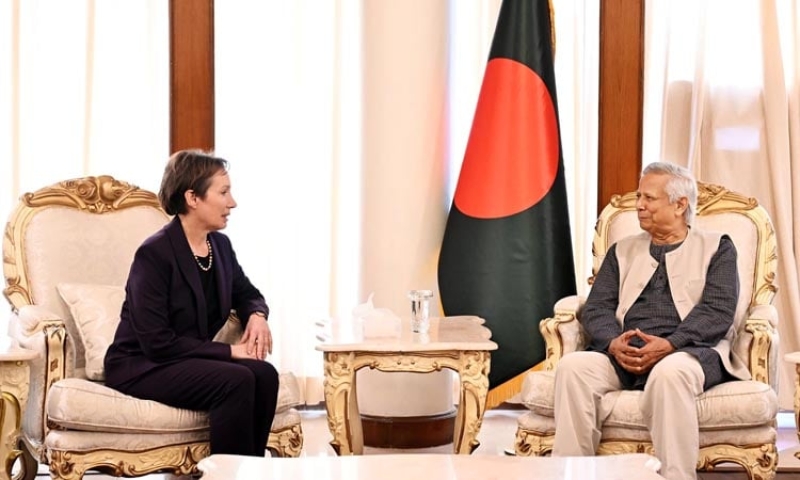- World Bank to Provide $150.75m for Bangladesh RAISE Project |
- Press Secretary Alleges Indian Media, AL Spread Disinformation |
- Hasina Gets 10 Years in Purbachal Plot Corruption Cases |
- NASA Finds Ammonia Compounds on Jupiter Moon Europa |
- Remittance Inflow Surges 45% to $3.17bn in January |
US Reaffirms Support for Bangladesh’s Interim Govt

Tracey Ann Jacobson, the new Charge d'affaires at the US embassy in Dhaka, reaffirmed America's commitment to supporting Bangladesh's Interim Government in various areas, including development and counter-terrorism, during a meeting with Chief Adviser Professor Muhammad Yunus at the State Guest House Jamuna on Monday.
Jacobson assured the Chief Adviser of US backing on multiple fronts. “We are ready to support your government on a range of issues,” she told Yunus.
The Chief Adviser briefed Jacobson on Bangladesh's ongoing reform initiatives, efforts to build political consensus around the July proclamation, and plans for the upcoming general elections. He expressed confidence that political parties would reach a consensus on the proclamation by early February. "So far, I have not heard any dissenting voices," Yunus said, describing the process of building consensus as "tough" but underscoring the theme of "unity" in the proclamation.
Yunus emphasized that the government’s role is solely to facilitate the process, stating, “I am not pushing any idea. My job is building a consensus." He added that once an agreement is reached, the government would ask political parties to sign it, creating what would be known as the July Charter. “The contents might vary, but once signed, our politics will be based on it,” he noted.
Jacobson also expressed concerns about the arrest of journalists and reported violence against religious minorities in Bangladesh. In response, Yunus reassured her that his government is committed to ensuring justice for all citizens.
The two also discussed Bangladesh's relations with its neighbors, the ongoing Rohingya crisis, and security issues in Myanmar. Yunus emphasized the importance of regional cooperation, citing Bangladesh's role in founding SAARC and his efforts to revive the organization. He also requested continued US support for the safe repatriation of Rohingya refugees and the creation of a safe zone for displaced people in Myanmar's Rakhine State.
In the economic sphere, Yunus highlighted Bangladesh's status as a top importer of US cotton and urged increased US imports of Bangladeshi textiles and apparel to further strengthen trade ties.
Lamiya Morshed, Senior Secretary for SDG Affairs, also attended the meeting.

